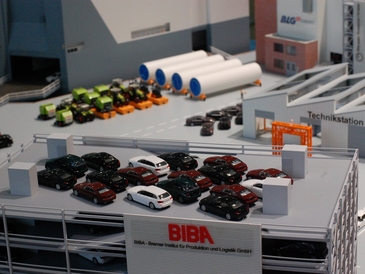No matter whether cars, bananas, or parcels – consignments of all sorts have to be delivered to the customer as fast as and as cheaply as possible. Logistics process chains are highly complex and should not be allowed to burden the environment. Goods are expected to arrive at their destination fresh, undamaged, and on time. New information and communication technologies (ICT) and robotic systems can be combined to provide dynamic and flexible transport and storage solutions which are also environmentally friendly. The University of Bremen’s Institute of Production and Logistics (BIBA) has joined forces with some of its R&D partners to exhibit their state-of-the-art logistics solutions at the Hannover Messe, which will take place from 23rd till 27th April. They can be found on the shared stand of the Federal Ministry for the Economy and Technology (BMWi) (Hall 2, Stand D30) and on the shared stand “Logistikfabrik – Automatisierung in der Logistik” (Hall 7, Stand A48).
Easy-to-steer Robots and Thinking Containers!
On the shared stand “Logistikfabrik – Automatisierung in der Logistik” [Logistics factory – automation in logistics], together with the University of Bremen’s Institute of Microsensors, Actuators and Systems (IMSAS) and their project partners, the BIBA will also be demonstrating how easy it is to use robots via “intuitive programming”. A small hand-held device describes an arc in space, and the robots follow the instructions it issues, for example to discharge parcels from a pallet. Visitors are invited to experiment for themselves and see how easy it is to steer robots in this way.
“Intelligent containers” ensure that tropical fruit and Argentine beef arrive fresh on the table. Equipped with the latest IC and sensor technology, they are capable of collecting and evaluating data – and can even interfere in the ripening process of fruit while still in transit. One of these containers will be on display to visitors on Stand A48, Hall7.
“RAN” Pilots Vehicles Cleverly and Efficiently through the Port
A model port terminal created during the RAN project (RFID-based Automotive Network) will be on display on the shared stand with the BMWi (Hall 2, Stand D30). It illustrates how cars virtually steer themselves while being transshipped from the carrier vessel to waiting car transporters. Throughout the whole process, the cars are monitored using RFID technology, transmitting event messages via an IT system. Data is also sent out to partners downstream the process chain. The model was funded within the context of the technology program called Autonomik (autonomous and simulation-based systems for the Mittelstand) run by the BMWi.
And to top it all, additional support is provided by the easyTracing system, another ICT technology which is integrated in the clothing worn by the port workers and will eventually replace more conventional devices. This automates the process of collecting data and simplifies the work process. Both demonstrators were created by BIBA. The aim of the project is to increase the transparency of information in production and logistics networks in the automobile industry.
Contact and further information:
Universtität Bremen
Dipl.-Ing. Ann-Kathrin Pallasch
(BIBA, Logistikfabrik – Automatisierung in der Logisitik)
Tel: +49 421 218-50132
E-Mail: palprotect me ?!biba.uni-bremenprotect me ?!.de

